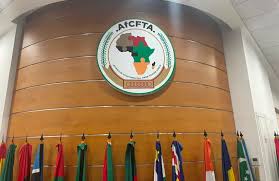The rising cost of transporting goods across West Africa is putting pressure on Nigerian exporters and casting doubt on the feasibility of the African Continental Free Trade Area (AfCFTA) agreement. Exporters and trade experts say the cost of moving goods by road from Nigeria to other African countries has become alarmingly high, driven by unofficial levies, multiple checkpoints, bribes, and inconsistent customs procedures along the transport corridors.
According to a recent case study by the West African Association for Cross-Border Trade in Agro-Forestry-Pastoral and Fisheries Products (WACTAF), it now costs over ₦10.84 million to move a truckload of goods worth ₦100 million from Lagos to Accra by road. This route, covering approximately 1,726 kilometres, passes through Benin, Togo, and Ghana, with Benin reportedly being the most expensive stretch.
Salami Nasiru, Executive President of WACTAF, explained that the bulk of the charges are incurred after entering Benin Republic. Exporters are required to pay a road maintenance fee of 0.85% of the Cost, Insurance, and Freight (CIF) value, which amounts to ₦850,000. This is followed by a security tax of 0.5% (₦500,000), a customs bond of 0.25% (₦250,000), and a statistics levy of 7.23%, which alone costs a staggering ₦7.23 million. A customs stamp fee of 0.4% of the statistics levy adds an additional ₦28,920.
Beyond these percentage-based levies, flat-rate charges like 75,000 CFA for truck tracking, and other undocumented fees at customs checkpoints, drive the cost of navigating Benin to approximately ₦9.05 million, Nasiru said.
In Togo, exporters are slammed with more charges including a 1% statistics fee (₦1 million), another 0.25% customs bond, and a 15,000 CFA tracking fee. Extra charges like truck scaling, which cost an estimated ₦50,000, further add to the burden. Upon reaching the Togo-Ghana border, traders face a $200 administrative fee (₦300,000), a 50,000 CFA tracking device fee, a 30,000 CFA transit board fee, and a 50,000 CFA processing charge. These fees raise the total costs on the Togo–Ghana leg to about ₦1.78 million.
Combined, the cost of transporting a single truckload of goods from Lagos to Accra adds up to ₦10.84 million, and this figure does not include warehousing, insurance, or inland transport within Nigeria. Stakeholders say these high expenses are crippling Nigerian exports, making them less competitive and undermining the vision of seamless trade under the AfCFTA framework.
Frustrated by the situation, many exporters are calling for urgent reforms. They argue that the reality on ground is far from the promises of AfCFTA, which seeks to reduce barriers and promote intra-African trade. Exporters are demanding the full enforcement of existing regional trade protocols, elimination of non-tariff barriers, harmonised customs procedures, and better transparency.
Olubunmi Olumekun, President of the Association of West African Exporters and Marine Professionals (AWAEMAP), has joined other voices calling for a review of Nigeria’s over-reliance on road transport. He suggested that barging could be a more efficient and cost-effective alternative.
Olumekun, who also serves as the President of the Barge Operators Association of Nigeria (BOAN), shared that Nigerian barges have been successfully used to transport goods to Togo. He noted that in some cases, neighbouring countries even hired Nigerian barges for long-term operations and paid competitive rates.
“I took a barge to Togo, and in just a few days, we were back. Togo came here, rented our barges, and we operated there for months and got paid. There are some routes you can take where goods reach West African ports without ever going through the ocean,” he said.
He stressed that if more investment is made in inland waterways and alternative transport methods, it would drastically reduce the cost pressures faced by exporters and make regional trade smoother and more profitable.
Stakeholders are now urging the Nigerian government and the Economic Community of West African States (ECOWAS) to take bold steps to enforce trade agreements, remove corrupt practices, and invest in critical logistics infrastructure such as barge terminals, dry ports, and rail links.
With AfCFTA projected to boost Africa’s economy by over $450 billion over the next 10 years, experts say urgent action is needed to address these road transport bottlenecks. Otherwise, the benefits of free trade in Africa could remain a paper promise rather than a reality for Nigerian businesses.
